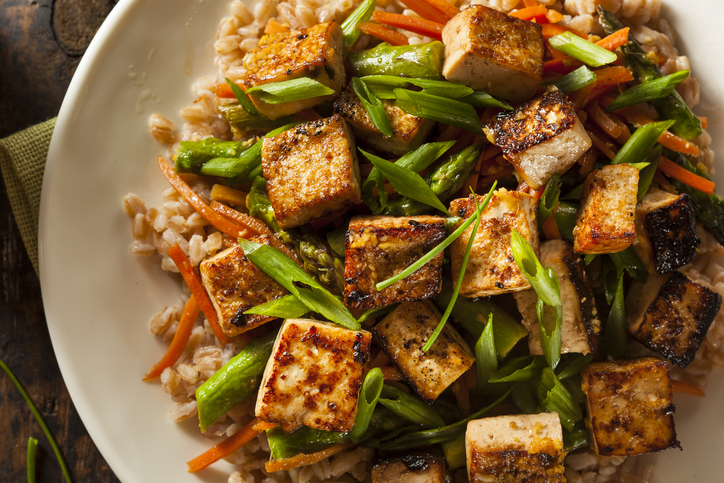By Isabelle Huot
Legumes, nuts, seeds, and soy in all its many forms are not only healthful but good for the environment
A Protein Primer
Tofu: Tofu is a plant protein made from soybeans that are soaked and boiled; the bean pulp is removed, and the liquid is then curdled using either calcium sulphate or magnesium chloride. There are two main types of tofu and two kinds of each: soft and silky and firm and extra-firm. The difference is that soft/silky tofus aren’t drained, while firm/ extra-firm tofus are pressed, resulting in a higher protein content.
Tempeh: This vegetable protein from Indonesia is made from fermented soybeans. During processing, the soybeans are cooked and crushed, and then a fungus— Rhizopus oligosporus—is added as a starter culture. Tempeh, which is more bitter-tasting than tofu, is richer in protein and must be cooked before being eaten.
Textured Vegetable Protein: Also called TVP, textured vegetable protein is a soy product. It’s made from defatted soy flour that is cooked under pressure and then dried. Often used to replace ground meat, it must be rehydrated before being eaten.
Seitan: Made from wheat gluten, this plant protein has a soft texture. It can be cooked in a variety of ways: steamed, baked, fried, stewed, and more. It’s important to note, though, that because it contains gluten, it isn’t suitable for people with celiac disease.
Nutrition Facts
Calcium. Tofu made with calcium sulphate is a good source of calcium. Cholesterol. Unlike animal products, plant proteins contain no cholesterol.
Fibre. Plant proteins provide fibre, which animal protein doesn’t contain.
Iron. Plant proteins contain non-heme iron, which isn’t absorbed as well as the heme iron in animal protein. Adding vitamin C (fruits and vegetables) or animal protein, even in small quantities, to your diet increases absorption.
Protein. The protein content varies from one product to the next. (See table.) Unlike animal protein, most plant proteins are incom- plete—they don’t contain all the essential amino acids in sufficient quantities. Among plant proteins, only soy (tofu, tempeh) is con- sidered a complete protein. But you can still meet your needs for essential amino acids without consuming animal protein: simply include legumes, whole grains, and nuts in your daily menu.
Vitamin B12. Most plant proteins don’t contain vitamin B12, which is found mainly in animal protein. Tempeh is an exception, as it is nat- urally rich in vitamin B12, but it’s in a form that the body can’t absorb or use. For vegetable sources of vitamin B12, turn to enriched vegetable proteins, such as soy beverages.
Zinc. Tofu and tempeh are good sources of zinc.
So Many Benefits
Heart health. Plant proteins provide fibre and contain less saturated fat than animal protein, and fibre helps to lower blood cholesterol.
A better menu option. The World Health Organization has categorized red meat as a potential carcinogen and processed meat as carcinogenic. Choosing plant proteins more often is a good way to reduce your consumption of red meat.
Disease prevention. Generally speaking, a diet rich in fresh, unprocessed plant foods can help to prevent diseases including cancer, type 2 diabetes, and obesity.
|
Plant protein |
Grams of protein per 100-gram serving |
|
• Firm or extra-firm tofu |
8 |
|
• Textured vegetable protein, in small grains, rehydrated |
17 |
|
• Tempeh, cooked |
18 |
|
• Seitan |
21 |
Isabelle Huot holds a Ph.D. in nutrition.






